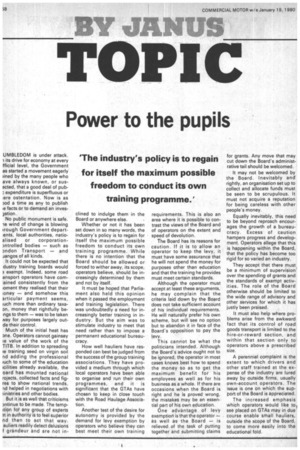Power to the pupils
Page 60

If you've noticed an error in this article please click here to report it so we can fix it.
'The industry's policy is to regain for itself the maximum possible freedom to c■induct its own training programme.'
UMBLEDOM is under attack. 1 its drive for economy at every fficial level, the Government as started a movement eagerly rifled by the many people who aye always known, or susacted, that a good deal of pub: expenditure is superfluous or lere ostentation. Now is as pod a time as any to publish ie facts or to demand an inves)ation.
No public monument is safe. le wind of change is blowing 'rough Government departents, local authorities, natio
alised or corporationDntrolled bodies — such as Dndon Transport — and JI an g os of all kinds.
It could not be expected that dustry training boards would exempt. Indeed, some road ansport operators have cornained consistently from the Foment they realised that their ioney — and somehow this articular payment seems, iuch more than ordinary taxaDn, money that rightfully bengs to them — was to be taken Nay for purposes largely outde their control.
Much of the initial heat has Dne. Operators cannot gainsay re value of the work of the TITB. in addition to spreading re training seed on virgin soil rid adding the professional ruch to some of -the education icilities already available, the oard has mounted national rojects, collected facts and figres to show national trends, -id helped in negotiations with rinistries and other bodies.
But it is as well that criticisms Detinue to be made. The tempition for any group of enierts §t in authority is to feel superior nd then to act that way. auliers readily detect delusions f grandeur and are not in
dined to indulge them in the Board or anywhere else.
Whether or not it has been set down in so many words, the industry's policy is to regain for itself the maximum possible freedom to conduct its own training programme. While there is no intention that the Board should be allowed or forced to wither away, its scope, operators believe, should be increasingly determined by them and not by itself.
It must be hoped that Parliament also held this opinion when it passed the employment and training legislation. There was undoubtedly a need for increasingly better training in industry. But the aim was to stimulate industry to meet that need rather than to impose a permanent educational bureaucracy.
How well hauliers have responded can best be judged from the success of the group training associations. They have provided a medium through which local operators have been able to organise and run their own programmes, and it is significant that the GTAs have chosen to keep in close touch with the Road Haulage Association.
Another test of the desire for autonomy is provided by the demand for levy exemption by operators who believe they can best meet their own training requirements. This is also an area where it is possible to contrast the views of the Board and of operators on the extent and speed of devolution.
The Board has its reasons for caution. If it is to allow an operator to keep the levy, it must have some assurance that he will not spend the money for purposes other than education and that the training he provides must meet certain standards.
Although the operator must accept at least these arguments, he may complain that the criteria laid down by the Board does not take sufficient account of his individual requirements. He will naturally prefer his own scheme, but will see no option but to abandon it in face of the Board's opposition to pay the levy.
This cannot be what the politicians intended. Although the Board's advice ought not to be ignored, the operator in most cases knows best how to spend the money so as to get the maximum benefit for his employees as well as for his business as a whole. If there are occasions when the Board is right and he Is proved wrong, the mistakes may be an essential part of his own education.
One advantage of levy exemption is that the operator — as well as the Board — is relieved of the task of putting together and submitting claims for grants. Any move that may cut down the Board's administrative tail should be welcomed.
It may not be welcomed by the Board. inevitably and rightly, an organisation set up to collect and allocate funds must be seen to be scrupulous. It must not acquire a reputation for being careless with other people's money.
Equally inevitably, this need to be beyond reproach encourages the growth of a bureaucracy. Excess of caution hampers progress and development. Operators allege that this is happening within the Board, that the policy has become too rigid for so varied an industry.
They accept that there must, be a minimum of supervision' over the spending of grants and the standards of exempt activities. The role of the Board otherwise should be limited to the wide range of advisory and other services for which it has justly been praised.
It must also help where problems arise from the awkward fact that its control of road goods transport is limited to the hire-or-reward section, and within that section only to. operators above a prescribed size.
A perennial complaint is the extent to which drivers and other staff trained at the expense of the industry are lured away by outside firms, usually own-account operators. The issue is one on which the support of the Board is appreciated.
The increased emphasis Which operators would Ilke toi see placed on GTAs may in due course enable small hauliers, outside the scope of the Board, to come more easily into the educational fold.












































































































